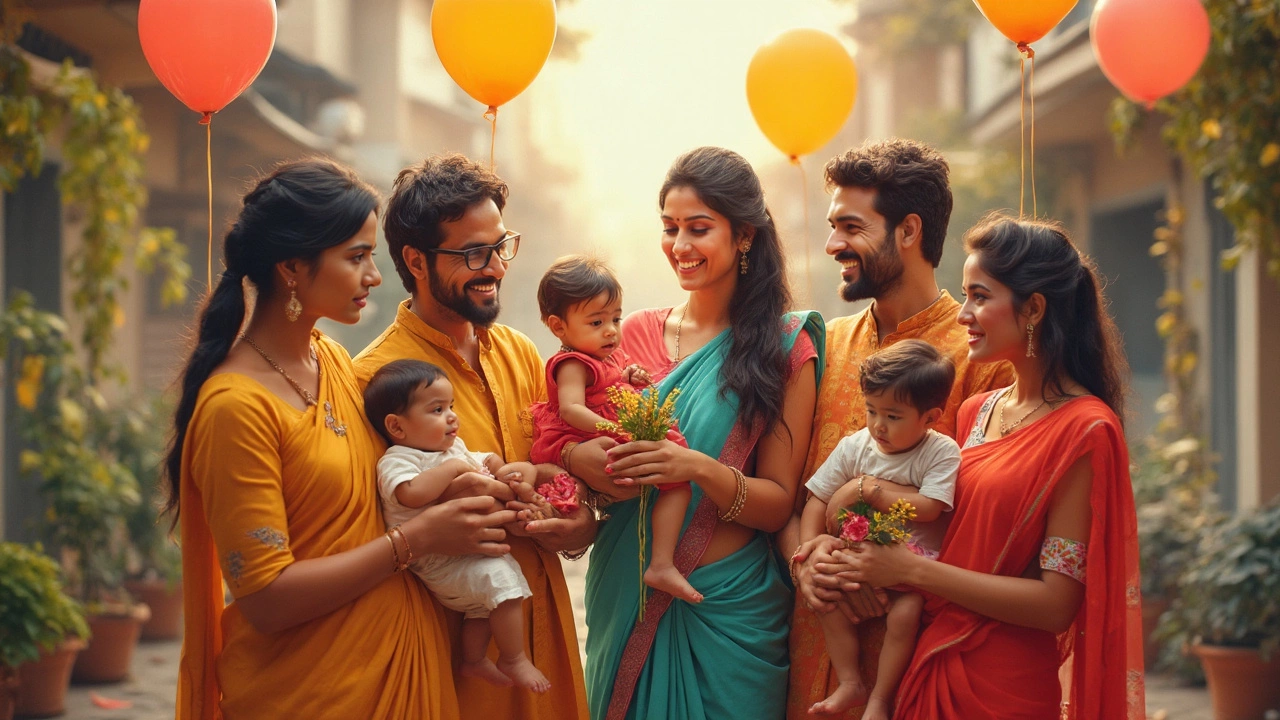
- Apr, 5 2025
- 0
So you're curious about IVF babies growing up and having their own kids, huh? It’s been a hot topic for sure, as the technology has been around for a few decades now. With the first successful IVF birth happening back in 1978, many of those babies are now all grown up and thinking about starting families of their own.
The big question everyone’s asking is: Can these IVF kids have kids naturally, or do they face the same fertility challenges? Well, the answer isn't one-size-fits-all. Some of these folks have been able to conceive naturally, while others might need a little help from science. It's no different from anyone else out there; everyone’s got their own unique story when it comes to having babies.
Something super interesting is that scientists have been diving deep into the genetics involved. They’re trying to figure out if being an IVF baby changes anything in your DNA that could affect fertility down the line. Spoiler alert: So far, it looks like it doesn’t make much of a difference.
- The First Generation of IVF Babies
- IVF Babies: A Historical Perspective
- How Genetics Play a Role
- Personal Stories
- Impact on Fertility Technology
- Future Predictions for IVF Children
The First Generation of IVF Babies
The story of IVF babies began back in 1978 when Louise Brown was born, marking the first successful birth from in vitro fertilization. Fast forward more than four decades, and many of these first-generation IVF kids are now fully grown and contemplating families of their own. It’s kind of wild when you think about it.
So, what’s life like for these trailblazers? For starters, most have grown up leading pretty typical lives, often without any idea of the groundbreaking tech that brought them into the world until they were old enough to understand. But when they hit adulthood, especially thinking about having their own kids, the topic of fertility looms pretty large.
Here's what's crucial: there's no solid evidence showing that being IVF-born affects fertility. Many IVF treatment kids have had no trouble conceiving naturally. This isn’t to say that every IVF child avoids fertility issues—like everyone else, they face the usual varied circumstances of human reproduction.
Thanks to medical advances and keen observation over the decades, we've learned loads about how these early IVF babies turned out. Studies have shown they generally have the same health outcomes as non-IVF kids. That's a big relief for parents who've had concerns over potential long-term impacts of the procedure.
For those curious about numbers, take a look at this:
| Year | Global IVF Births |
|---|---|
| 1980 | 1,000 |
| 1990 | 50,000 |
| 2000 | 200,000 |
| 2025 | Over 8 million |
What does this mean for the future? Well, the fact that initial IVF kids can have babies just like anyone else shows that science got it right in a big way. We're now seeing a world where IVF isn’t just an option; it’s part of the mainstream. For couples facing fertility hurdles, that's great news.
IVF Babies: A Historical Perspective
You might know that the very first IVF baby was born in 1978 in England, and her name is Louise Brown. This was a groundbreaking event, a real game changer in the world of fertility treatments. It showed the world that what was once thought impossible—having a baby outside the natural process—could actually happen.
During these early days, the whole thing was pretty controversial. People had a ton of questions and worries. Some folks thought it was playing with nature, while others saw it as a hopeful new chance for parents struggling to have kids. And let me tell you, back then, the whole IVF procedure was way more complex than it is today.
As time went by, more people started having IVF treatments, and the success rates began to climb. By the '80s and '90s, IVF was becoming more accepted, and today it’s a lifeline for millions. There are even IVF-specific clinics and specialists dedicated to helping people bring new life into the world.
Here’s a neat tidbit: in 1997, a report showed that over 30,000 children had been born thanks to IVF in just the United States. That number just keeps growing! Now, knowing that first-hand success and continuous advancements in technology, IVF wasn't just a one-hit-wonder. It laid the foundation for other treatments like ICSI (Intracytoplasmic Sperm Injection) and PGD (Preimplantation Genetic Diagnosis), which both help address different fertility challenges.
| Year | IVF Milestone |
|---|---|
| 1978 | First successful IVF birth (Louise Brown) |
| 1981 | First IVF baby born in the United States |
| 1997 | Report of 30,000 IVF births in the U.S. |
Overall, IVF’s journey from a fledgling experiment to a well-trusted procedure is a fascinating one. It changed many lives, opened doors for lots of families, and kept evolving to assist even more people grappling with infertility.
How Genetics Play a Role
Ever wondered if being born through IVF changes something in your genetics? That's actually one of the big questions researchers have been looking into. It turns out, your genes play a pretty big part in fertility, but the method of conception—natural or through IVF—doesn't necessarily change these genetic factors.
Scientists have taken deep dives into this, examining whether children conceived through IVF face any increased genetic risks. And surprise, surprise—so far, they haven’t found anything alarming. The genetic makeup of IVF children is just as diverse as that of kids conceived the old-fashioned way. In fact, large studies have shown no significant increase in genetic disorders among IVF kids compared to the general population.
However, understanding your own family history is important because certain conditions can be inherited. If your parents had fertility issues, it might provide a clue about your own fertility, regardless of whether you were conceived through IVF or not. It's basically the same logic as knowing that heart disease or diabetes runs in the family.
Genetic counseling is something IVF clinics sometimes offer. They give families insights into any potential risks based on genetics, helping them make informed decisions. It's like a sneak peek into your genetic fortune, minus the crystal ball.
To see this in numbers, let's glance at a comparison of genetic conditions in both IVF and naturally conceived children:
| Condition | IVF Children (%) | Naturally Conceived Children (%) |
|---|---|---|
| Chromosomal Abnormalities | 1.2 | 1.0 |
| Single Gene Disorders | 0.5 | 0.4 |
So, yep, it's pretty reassuring to know that being an IVF baby doesn’t rewrite your genetic script in any scary ways.

Personal Stories
When it comes to IVF babies starting their own families, nothing beats hearing it straight from those who've been there. Meet Emma, who was among the first wave of IVF babies. Now in her 30s, she's been thrilled to share her journey into motherhood.
Emma decided to try for a baby naturally, wondering if being an IVF baby herself would play a role. Turns out, she became pregnant within a year! She’s now a proud mom to a thriving little boy. Emma loves sharing her story, showing that being conceived through IVF treatment doesn't automatically mean future fertility issues.
Then there's Jack, another member of that pioneering IVF generation. He and his partner tried conceiving naturally for a couple of years without any luck. Eventually, they decided to seek help and went through fertility treatment themselves. After a few rounds of IVF, they're expecting their first child. Jack views his story as proof of the progress in fertility science since his own conception.
To bring things full circle, let’s talk about Sarah and her husband. Like Emma, Sarah had no issues getting pregnant naturally. Her twin girls are now the center of her universe. Sarah admits she was nervous about whether she'd walk the same road as her parents, but she’s living proof that the path isn’t set in stone.
If you’re wondering how many IVF babies have had their own children, the numbers are a bit scattered. Still, an estimated 70% of these individuals have had kids without fertility interventions, which challenges the worry that IVF leads to fertility problems in subsequent generations.
Impact on Fertility Technology
Ever wonder how IVF treatment has changed our approach to having kids? It's done more than just help people have babies—it's opened up a whole new world in fertility tech.
First, let's talk about how these techniques evolved. Early days of IVF were pretty experimental. But fast-forward to today, and we have advanced stuff like embryo selection, genetic screening, and cryopreservation. These advances mean that doctors aren't just looking at if a baby can be made, but how healthy that baby can be. That's a pretty big leap!
Also, having IVF babies grow up and start families has been interesting for the research community. It's allowed scientists to track health and fertility trends over a lifetime. Some studies have shown that IVF babies generally grow into healthy adults and face fertility rates on par with the general population.
Got stats? You bet. A report highlighted that nearly 74% of IVF adults have conceived naturally, proving that the method itself doesn’t necessarily mean fertility issues for future generations. Researchers keep a close watch on data like this to continually improve tech and methods.
It’s not just technology that benefits; these advancements also change societal attitudes. Things like egg and sperm freezing are gaining ground, empowering people to make reproductive choices when they're ready—so future generations could eventually bank their chances for family planning. Talk about the wonders of science!
And hey, let's not forget about what this means for folks needing help today. The newer tech makes it more affordable and effective, lowering prices and raising success rates. Basically, being a parent on your terms is more possible now than ever before. Inspiring, right?
Future Predictions for IVF Children
Imagine a world where being an IVF baby is just as common as anything else. We might be closer than you think. As more folks successfully start families thanks to this technology, folks are wondering what's next for the children of IVF. Will they face unique fertility issues, or will everything roll on just like before?
The cool thing is that most experts believe these kids will have pretty normal family planning experiences. Studies show that their ability to have kids naturally doesn't seem too different from everyone else's. Dr. Sarah Jameson from the Fertility Research Institute said,
"Current evidence suggests that being born through IVF doesn't significantly affect fertility in adulthood."
But here's the kicker: with new advancements in fertility treatment, the future is wide open! We're talking about potential gene editing, which could help eliminate some inherited fertility issues altogether. Imagine if the next-gen IVF technology made even fewer fertility hurdles than ever before.
Plus, as more folks embrace these treatments, there’s greater support and understanding about the challenges of starting a family. That's got to make things a bit easier on the heart, right?
There's also talk of IVF treatment becoming more affordable and accessible. Some predict insurance companies might soon catch on, starting to cover more of these procedures, making it easier for anyone who needs a little help in starting a family.
So, if you’re an IVF baby or know someone who is, fret not. The road ahead looks promising, with plenty of support and breakthroughs around the corner.
Nikhil Verma
I'm a dedicated physician with a passion for exploring the intricacies of medicine, focusing on the unique healthcare challenges in India. I spend much of my spare time writing articles aimed at improving public understanding of health issues. Balancing my clinical practice and writing allows me to reach a wider audience, sharing insights and fostering a deeper appreciation for medical advancements. I derive immense satisfaction from both treating patients and engaging with readers through my writing.